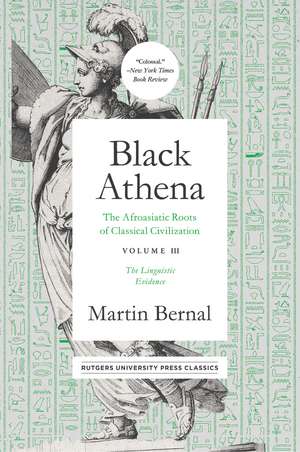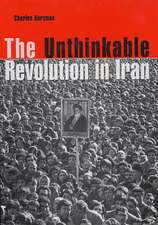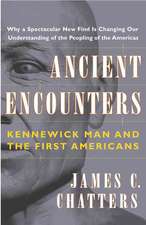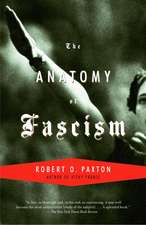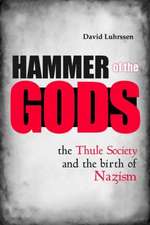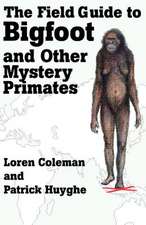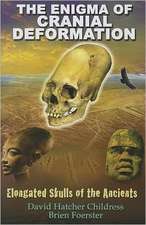Black Athena: The Afroasiatic Roots of Classical Civilation Volume III: The Linguistic Evidence
Autor Martin Bernalen Limba Engleză Hardback – 14 feb 2020
What is classical about Classical civilization? In one of the most audacious works of scholarship ever written, Martin Bernal challenges the foundation of our thinking about this question. Classical civilization, he argues, has deep roots in Afroasiatic cultures. But these Afroasiatic influences have been systematically ignored, denied or suppressed since the eighteenth century—chiefly for racist reasons.
The popular view is that Greek civilization was the result of the conquest of a sophisticated but weak native population by vigorous Indo-European speakers—Aryans—from the North. But the Classical Greeks, Bernal argues, knew nothing of this “Aryan model.” They did not see their institutions as original, but as derived from the East and from Egypt in particular.
This long-awaited third and final volume of the series is concerned with the linguistic evidence that contradicts the Aryan Model of ancient Greece. Bernal shows how nearly 40 percent of the Greek vocabulary has been plausibly derived from two Afroasiatic languages – Ancient Egyptian and West Semitic. He also reveals how these derivations are not limited to matters of trade, but extended to the sophisticated language of politics, religion, and philosophy. This evidence, according to Bernal, greatly strengthens the hypothesis that in Greece an Indo-European-speaking population was culturally dominated by Ancient Egyptian and West Semitic speakers.
Provocative, passionate, and colossal in scope, this volume caps a thoughtful rewriting of history that has been stirring academic and political controversy since the publication of the first volume.
Toate formatele și edițiile
| Toate formatele și edițiile | Preț | Express |
|---|---|---|
| Paperback (2) | 82.37 lei 23-34 zile | +33.00 lei 7-13 zile |
| Vintage Publishing – 21 noi 1991 | 82.37 lei 23-34 zile | +33.00 lei 7-13 zile |
| Rutgers University Press – 14 feb 2020 | 317.56 lei 3-5 săpt. | +130.94 lei 7-13 zile |
Preț: 924.04 lei
Preț vechi: 1017.87 lei
-9% Nou
Puncte Express: 1386
Preț estimativ în valută:
176.82€ • 185.93$ • 146.10£
176.82€ • 185.93$ • 146.10£
Carte indisponibilă temporar
Doresc să fiu notificat când acest titlu va fi disponibil:
Se trimite...
Preluare comenzi: 021 569.72.76
Specificații
ISBN-13: 9781978807204
ISBN-10: 1978807201
Pagini: 1012
Dimensiuni: 132 x 203 x 71 mm
Greutate: 0.94 kg
Ediția:First Edition, First Edition, First Paperback Edition
Editura: Rutgers University Press
Colecția Rutgers University Press Classics
ISBN-10: 1978807201
Pagini: 1012
Dimensiuni: 132 x 203 x 71 mm
Greutate: 0.94 kg
Ediția:First Edition, First Edition, First Paperback Edition
Editura: Rutgers University Press
Colecția Rutgers University Press Classics
Notă biografică
MARTIN BERNAL (1937-2013) was a British scholar of modern Chinese political history and a Professor of Government and Near Eastern Studies at Cornell University in Ithaca, New York. His celebrated Black Athena trilogy is a controversial series which argues that Ancient Greek civilization and language are Eastern and Egyptian in origin.
Cuprins
Contents
Preface and Acknowledgments
Transcriptions and Phonetics
Maps and Charts
INTRODUCTION
The previous volumes and their reception
“Classics has been misunderstood”
Anathema from a G.O.M.
Outline of Volume 3
Chapter 1 HISTORICAL LINGUISTICS AND THE IMAGE OF ANCIENT GREEK
Nineteenth-century romantic linguistics:
The tree and the family
Saussure and the twentieth-century epigones
of nineteenth-century Indo-European studies
Ramification or interlacing
Chapter 2 THE “NOSTRATIC” AND “EUROASIATIC” HYPERAND SUPER-FAMILIES
Nostratic and Eurasiatic
Archaeological evidence for the origin of Nostratic and Euroasiatic
Gordon Childe and Colin Renfrew
Language and genetics
Conclusion
Chapter 3 AFROASIATIC, EGYPTIAN AND SEMITIC
The origins of African languages and the development of agriculture in Africa
The origins and spread of Afroasiatic
Conclusion
Chapter 4 THE ORIGINS OF INDO-HITTITE AND INDOEUROPEAN AND THEIR CONTACTS WITH OTHER LANGUAGES
The origins and diffusion of Indo-Hittite and Indo-European
Loans from other languages into PIH
Development of an Indo-European gender system based on sex
Conclusion
Chapter 5 THE GREEK LANGUAGE IN THE MEDITERRANEAN CONTEXT: PART 1, PHONOLOGY
Greek: Result of a linguistic shift or of language contact?
The elements of the Greek linguistic amalgam
The phonologies of Indo-Hittite and Indo-European
Phonological developments from PIE to Greek
Conclusion
Chapter 6 THE GREEK LANGUAGE IN THE MEDITERRANEAN CONTEXT: PART 2, MORPHOLOGICAL AND SYNTACTICAL
DEVELOPMENTS
Morphology
Syntax
Summary on syntactical changes
Conclusion
Chapter 7 THE GREEK LANGUAGE IN THE MEDITERRANEAN CONTEXT: PART 3, LEXICON
Introduction
The study of lexical borrowings
Ancient Greeks’ sense of lexical borrowing
Loans from Afroasiatic into Greek and into Albanian or
Armenian
Conclusion
Chapter 8 PHONETIC DEVELOPMENTS IN EGYPTIAN, WEST SEMITIC AND GREEK OVER THE LAST THREE MILLENNIA BCE, AS REFLECTED IN LEXICAL BORROWINGS
Introduction
Semitic
Egyptian
Conclusion
Chapter 9 GREEK BORROWINGS FROM EGYPTIAN PREFIXES, INCLUDING THE DEFINITE ARTICLES
Introduction
Greek Borrowings from Egyptian definite article prefixes
The Egyptian word pr “house, temple, palace”
R- “entry” or local prefix
(R)dˆt, “causal prefix”
Greek borrowings from Egyptian verbs beginning with dˆ(t)-
Conclusion
Chapter 10 MAJOR EGYPTIAN TERMS IN GREEK: PART 1
1. Ntr/KÅ
2. OEnΔ
3. M(w)dw, mu'qo"
4. SbÅ
5. Dr, R-dr, drw
6. ÷Mwr,MÅOEt, Moi'ra, Meivromai and MmÅOEt, Ma
7. Ôpr
Conclusion
Chapter 11 MAJOR EGYPTIAN TERMS IN GREEK: PART 2
nfr (w)/ms
nfr/ms
Conclusion
CONTENTS
Chapter 12 SIXTEEN MINOR ROOTS
Introduction
CONCLUSION
Chapter 13 SEMITIC SIBILANTS
Introduction
Loans of sibilants from Canaanite into Greek
Lateral fricatives
Sheltered /s/ sC /s/ before consonants
Conclusion
Chapter 14 MORE SEMITIC LOANS INTO GREEK
Introduction
Conclusion
Chapter 15 SOME EGYPTIAN AND SEMITIC SEMANTIC CLUSTERS IN GREEK
Nature and agriculture
Cooking
Medicine
Conclusion
Chapter 16 SEMANTIC CLUSTERS: WARFARE, HUNTING AND SHIPPING
Weapons, warfare and hunting
Shipping
Chapter 17 SEMANTIC CLUSTERS: SOCIETY, POLITICS, LAW AND ABSTRACTION
Introduction
Society
Politics
Law and order
Abstraction
Chapter 18 RELIGIOUS TERMINOLOGY
Structures
Personnel
Cult objects
Rituals
Sacrifices
Incense, flowers, scents
Aura
Mysteries
Conclusion
Chapter 19 DIVINE NAMES: GODS, MYTHICAL CREATURES, HEROES
Introduction: Gods
Ôpr, “become” Ôprr, Apollo, Askle\pios, Python and Delphi
Apollo the “Aryan”
Was Apollo a sun god before the fifth century?
Twins, Apollo and Artemis
Other Olympians
Zeus Nsw
Other gods
Herodotos’ non-Egyptian divine names
Demigods
Mythical creatures
Some heroes
Conclusion
Chapter 20 GEOGRAPHICAL FEATURES AND PLACE-NAMES
Introduction
Natural features
City names
Conclusion
Chapter 21 SPARTA
Introduction
Sparta: *sper and SpÅt
Anubis, Hermes and Sparta
“Late” borrowings and Lykurgos
Lakonian terminology Egyptian?
Sparta and death
Spartans and Jews
Chapter 22 ATHENA AND ATHENS
Introduction
Summary of the chapter
Armor and equipment
Athena and her victims
Athens as a colony from Sais?
Summary of the cultic evidence
Etymology of names
H˘t ntr (nt) Nt Athe\na(ia)
Conclusion
CONCLUSION
Notes
Glossary
Greek Words and Names with Proposed Afroasiatic Etymologies
Letter Correspondences
Bibliography
Index
Preface and Acknowledgments
Transcriptions and Phonetics
Maps and Charts
INTRODUCTION
The previous volumes and their reception
“Classics has been misunderstood”
Anathema from a G.O.M.
Outline of Volume 3
Chapter 1 HISTORICAL LINGUISTICS AND THE IMAGE OF ANCIENT GREEK
Nineteenth-century romantic linguistics:
The tree and the family
Saussure and the twentieth-century epigones
of nineteenth-century Indo-European studies
Ramification or interlacing
Chapter 2 THE “NOSTRATIC” AND “EUROASIATIC” HYPERAND SUPER-FAMILIES
Nostratic and Eurasiatic
Archaeological evidence for the origin of Nostratic and Euroasiatic
Gordon Childe and Colin Renfrew
Language and genetics
Conclusion
Chapter 3 AFROASIATIC, EGYPTIAN AND SEMITIC
The origins of African languages and the development of agriculture in Africa
The origins and spread of Afroasiatic
Conclusion
Chapter 4 THE ORIGINS OF INDO-HITTITE AND INDOEUROPEAN AND THEIR CONTACTS WITH OTHER LANGUAGES
The origins and diffusion of Indo-Hittite and Indo-European
Loans from other languages into PIH
Development of an Indo-European gender system based on sex
Conclusion
Chapter 5 THE GREEK LANGUAGE IN THE MEDITERRANEAN CONTEXT: PART 1, PHONOLOGY
Greek: Result of a linguistic shift or of language contact?
The elements of the Greek linguistic amalgam
The phonologies of Indo-Hittite and Indo-European
Phonological developments from PIE to Greek
Conclusion
Chapter 6 THE GREEK LANGUAGE IN THE MEDITERRANEAN CONTEXT: PART 2, MORPHOLOGICAL AND SYNTACTICAL
DEVELOPMENTS
Morphology
Syntax
Summary on syntactical changes
Conclusion
Chapter 7 THE GREEK LANGUAGE IN THE MEDITERRANEAN CONTEXT: PART 3, LEXICON
Introduction
The study of lexical borrowings
Ancient Greeks’ sense of lexical borrowing
Loans from Afroasiatic into Greek and into Albanian or
Armenian
Conclusion
Chapter 8 PHONETIC DEVELOPMENTS IN EGYPTIAN, WEST SEMITIC AND GREEK OVER THE LAST THREE MILLENNIA BCE, AS REFLECTED IN LEXICAL BORROWINGS
Introduction
Semitic
Egyptian
Conclusion
Chapter 9 GREEK BORROWINGS FROM EGYPTIAN PREFIXES, INCLUDING THE DEFINITE ARTICLES
Introduction
Greek Borrowings from Egyptian definite article prefixes
The Egyptian word pr “house, temple, palace”
R- “entry” or local prefix
(R)dˆt, “causal prefix”
Greek borrowings from Egyptian verbs beginning with dˆ(t)-
Conclusion
Chapter 10 MAJOR EGYPTIAN TERMS IN GREEK: PART 1
1. Ntr/KÅ
2. OEnΔ
3. M(w)dw, mu'qo"
4. SbÅ
5. Dr, R-dr, drw
6. ÷Mwr,MÅOEt, Moi'ra, Meivromai and MmÅOEt, Ma
7. Ôpr
Conclusion
Chapter 11 MAJOR EGYPTIAN TERMS IN GREEK: PART 2
nfr (w)/ms
nfr/ms
Conclusion
CONTENTS
Chapter 12 SIXTEEN MINOR ROOTS
Introduction
CONCLUSION
Chapter 13 SEMITIC SIBILANTS
Introduction
Loans of sibilants from Canaanite into Greek
Lateral fricatives
Sheltered /s/ sC /s/ before consonants
Conclusion
Chapter 14 MORE SEMITIC LOANS INTO GREEK
Introduction
Conclusion
Chapter 15 SOME EGYPTIAN AND SEMITIC SEMANTIC CLUSTERS IN GREEK
Nature and agriculture
Cooking
Medicine
Conclusion
Chapter 16 SEMANTIC CLUSTERS: WARFARE, HUNTING AND SHIPPING
Weapons, warfare and hunting
Shipping
Chapter 17 SEMANTIC CLUSTERS: SOCIETY, POLITICS, LAW AND ABSTRACTION
Introduction
Society
Politics
Law and order
Abstraction
Chapter 18 RELIGIOUS TERMINOLOGY
Structures
Personnel
Cult objects
Rituals
Sacrifices
Incense, flowers, scents
Aura
Mysteries
Conclusion
Chapter 19 DIVINE NAMES: GODS, MYTHICAL CREATURES, HEROES
Introduction: Gods
Ôpr, “become” Ôprr, Apollo, Askle\pios, Python and Delphi
Apollo the “Aryan”
Was Apollo a sun god before the fifth century?
Twins, Apollo and Artemis
Other Olympians
Zeus Nsw
Other gods
Herodotos’ non-Egyptian divine names
Demigods
Mythical creatures
Some heroes
Conclusion
Chapter 20 GEOGRAPHICAL FEATURES AND PLACE-NAMES
Introduction
Natural features
City names
Conclusion
Chapter 21 SPARTA
Introduction
Sparta: *sper and SpÅt
Anubis, Hermes and Sparta
“Late” borrowings and Lykurgos
Lakonian terminology Egyptian?
Sparta and death
Spartans and Jews
Chapter 22 ATHENA AND ATHENS
Introduction
Summary of the chapter
Armor and equipment
Athena and her victims
Athens as a colony from Sais?
Summary of the cultic evidence
Etymology of names
H˘t ntr (nt) Nt Athe\na(ia)
Conclusion
CONCLUSION
Notes
Glossary
Greek Words and Names with Proposed Afroasiatic Etymologies
Letter Correspondences
Bibliography
Index
Recenzii
Martin Bernal’s Black Athena is nothing short of a monumental achievement in scholarship that re-oriented and transformed serious study of ancient civilizations. It remains a soaring accomplishment of classical erudition of the Afroasiatic foundation of Greek history.
"In a spectacular undertaking, Martin Bernal sets out to... restore the credibility of what he calls the Ancient Model of the beginnings of Greek civilizations... Bernal makes an exotic interloper in Classical studies. He comes to them with two outstanding gifts: a remarkable flair for the sociology - perhaps one should say politics - of knowledge, and a formidable linguistic proficiency... The story told by Bernal, with many fascinating twists and turns and quite a few entertaining digressions, is... a critical inquiry into a large part of the European imagination... a retrospect of ingenious and often sardonic erudition."
"An astonishing work, breathtakingly bold in conception and passionately written... salutary, exciting, and, in its historiographical aspects, convincing."
"A work which has much to offer the lay reader, and its multi-disciplinary sweep is refreshing: it is an important contribution to historiography and the sociology of knowledge, written with elegance, wit, and self-awareness... a thrilling journey... his account is as gripping a tale of scholarly detection and discovery as one could hope to find."
"Bernal's material is fascinating, his mind is sharp, and his analyses convince."
"A formidable work of intellectual history, one that demonstrates that the politics of knowledge is never far from national politics."
"His book should be welcome to both classicists and ancient historians, most of whom will, now at least, be inclined to agree with him."
"Bernal's work and the stir it has occasioned have caused ancient historians and archaeologists to undertake a major reexamination of methods and motives."
"Colossal.... Bernal aims to revise current understanding of Ancient Middle Eastern history by taking seriously the ancient Greeks' legends that portrayed much in their civilization as originating in the Middle East, especially Egypt."
"Demands to be taken seriously... Every page that Bernal writes is educating and enthralling. To agree with all his thesis may be a sign of naivety, but not to have spent time in his company is a sign of nothing at all."
"A serious work that deals in a serious way with many of the principal issues of Aegean history in the second millennium B.C., and one can ask little more of any historical work."
"[Bernal's] multifaceted assault on academic complacency is an important contribution to the development of a more open, historical, and culturally oriented post-processual archaeology."
"A breathtaking panoply of archaeological artifacts, texts, and myths."
"Bernal's enterprise - his attack on the Aryan model and his promotion of a new paradigm - will profoundly mark the next century's perception of the origins of Greek civilization and the role of Ancient Egypt."
"Challenges the racism implicit in the recent 'cultural literacy' movement."
"A monumental and path-breaking work."
"[Martin Bernal] has forced scholars to reexamine the roots of Western civilization."
"Martin Bernal has managed to make the subject of Ancient Greece both popular and controversial."
"Black Athena is a powerfully written and brilliantly researched book that relentlessly unveils the historical and cultural African origins of Western civilization. Still a must read for all those in search of truth."
“Bernal has ample justification for calling into question many widely accepted hypotheses…. He shows that Egypt and its culture were misrepresented or simply ignored by European writers.”
Descriere
Black Athena, an audacious three-volume series, strikes at the heart of today's most heated culture wars. Martin Bernal challenges Eurocentric attitudes by calling into question conventional explanations for the origins of classical civilization. Provocative, passionate, and colossal in scope, this thoughtful rewriting of history continues to stir academic and political controversy.
